Free Tickets for Community College Students, Part 2
In this special two-part series, Director and Educator Daphnie Sicre discusses opportunities and strategies to offer free theatre tickets to community college students in New York City and beyond.
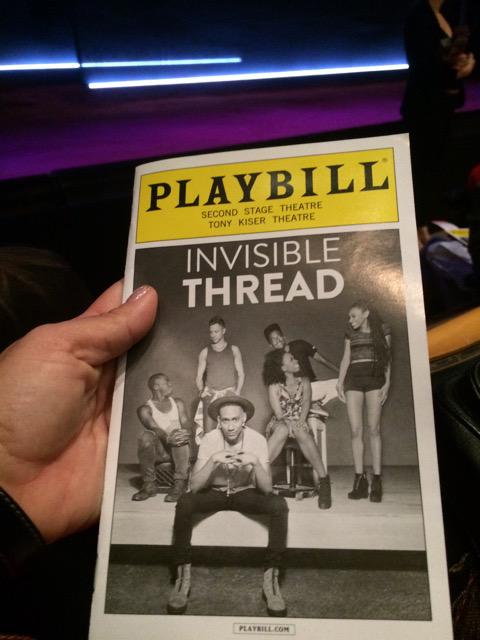
On November 4, 2015, I had the privilege of taking my class to see Second Stage’s performance of Invisible Thread by Griffin Matthews, directed by Diane Paulus through their Second Generation program. Most of my BMCC students had never seen a play before and this was the first time they were introduced to the world of live theatre. For Angel Cruz,
Watching the Invisible Thread, for a novice in theatre as myself, I found the play breath taking from the start. The concept of each play as its "own world", as one is taught in an introductory class of theatre, was clearly put into place as one walked into the space where the play would take place. To think one could be transported from NYC to Uganda in a matter of seconds is close to impossible, however, Invisible Thread made that happen for me. In addition, the themes of the humanitarian awareness found in the play left you thinking after the show.
Franchelli Rodriguez, another first time theatre student, shared:
This play was outstanding and definitely a lifetime experience especially for someone like me who does not often go to see productions. The message that I took from watching this was to always follow your dreams and not be afraid of letting the world know who you really are. This play attempted to touch each and every one of their audiences by sharing a true story and I truly believe they succeeded.
Both students were touched by the experience, and pledged to see more theatre after this. It is experiences like these that make these programs worth it.
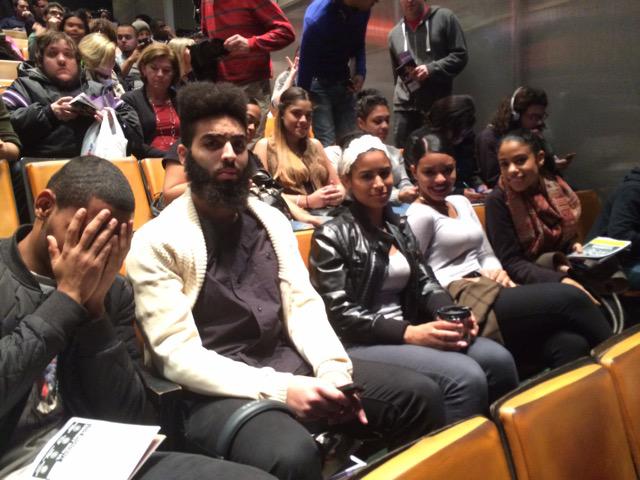
If these theatres are setting aside free tickets, then we must guarantee students in those seats. It takes a high level of organization, with constant follow through, and accountability.
Our program director, Katherine Kavanagh has developed partnerships with Soho Repertory Theatre, Manhattan Theatre Club (MTC), and New York City Center’s Encores. While MTC has held workshops with our students and offered them the opportunity to see a tech rehearsal first hand, Soho Rep established another program for our students to see shows for free. Soho Rep pledged to give 100 tickets per show to our students; that is at least twenty seats for five shows. Soho Rep was also developing an internship program with our students, where they will hopefully be able to work at the theatre through paid internships. When Kavanagh approached Soho Rep’s Artistic Director Sarah Benson about this new partnership, Benson understood firsthand the struggle of going to school and trying to gain professional theatre experience. She shared how she almost had to turn down an internship at Soho Rep when she was a grad student because it was an unpaid internship. Fortunately, she received a scholarship that allowed her to intern, and years later she became Soho Rep’s artistic director.
Although these programs have been a success at BMCC, they do not come at an easy price. They require sustainability, year after year. They also require effective communication between the theatre and the institution’s contact person; it is crucial to maintain these relationships. If these theatres are setting aside free tickets, then we must guarantee students in those seats. It takes a high level of organization, with constant follow through, and accountability. Commitment, and planning are key. When you deal with an audience who has never seen theatre, they do not understand that once they commit to see a show, they need to show up. When a student does not show up, that is an empty seat for that theatre, and an empty seat means loss of money. Sadly, if this becomes a pattern then theatres would have no choice but to keep lessening the number of free tickets they offer each time, or worse stop the offers altogether.
Yet, with challenges comes success. For starters, when students see theatre, they are better able to understand theatre. As a professor of theatre, I love to hear students reference a production. They make connections to the design elements they’ve read about, they start recognizing directors and writers, but most importantly, they incorporate the vocabulary they are learning into their daily lives.
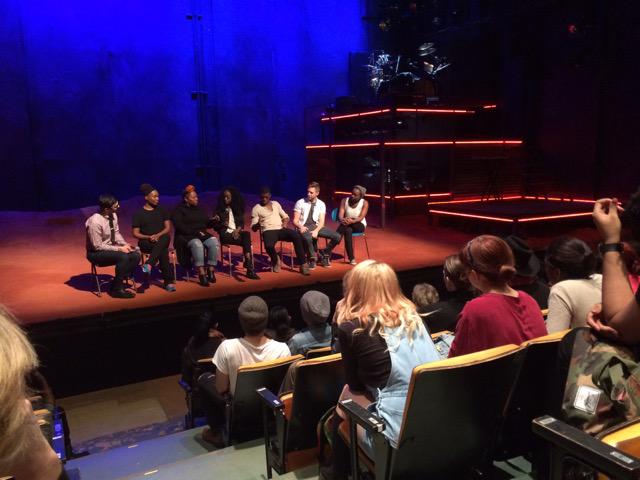
Our students also have a wonderful reputation with these theatres. These theatres appreciate their enthusiasm, and often ask for them to return. Many of them do, and they bring their friends and families to see the shows. Other theatres are starting to notice their reputation, and are calling our department asking for them. Our students can help diversify their audience, and bring new audiences to their theatres. Kavanagh explains, “The fact that BMCC has such a diverse student population was of great interest to them, since they’ve been making a real push to diversify audiences both on and off Broadway…I used to be knocking down doors, and now they call us.”
So, let’s make this happen, not just in NYC, but for community college students across the US. Theatres are very generous, they want to say yes and bring in new audiences. Let’s help them by doing the following:
- Remind them, this is just as beneficial for your students as it is for them.
- Let them know they are contributing to the education of their future audiences.
- Reach out to people in the industry, remind them these are the professionals they will work with in the future.
- Remind them patrons come with disposable incomes
- And if that does not work, invite the students to see a dress rehearsal. This will benefit the actors as well as the students. Instead of having an empty house, open it up to students who can learn from it.
- Let students oversee a technical rehearsal, this is of no cost to you, and will give theatre majors and scene design students a huge advantage for the future endeavors.
- Invite these students in, do not usher them through the back door.
- Try to create a preshow or a talkback at the end of the show as a learning experience.
- Acknowledge and thank them for being in the audience.
Lastly, theatre programs should attempt to build these connections. When you make these connects, make sure the students feel important. Pick shows that have actors, directors, designers, and playwrights that look like the students. There is an eclectic range of theatre out there; so pick theatres that are diverse and want outreach to diverse audiences. Do not wait until these theatres try to market to a specific ethnic group, instead find theatres already doing work that transcends all backgrounds.
Special Note: This fall, Soho Rep announced it had to close its doors temporarily. Fortunately, they still pledged to continue their relationship with BMCC students.

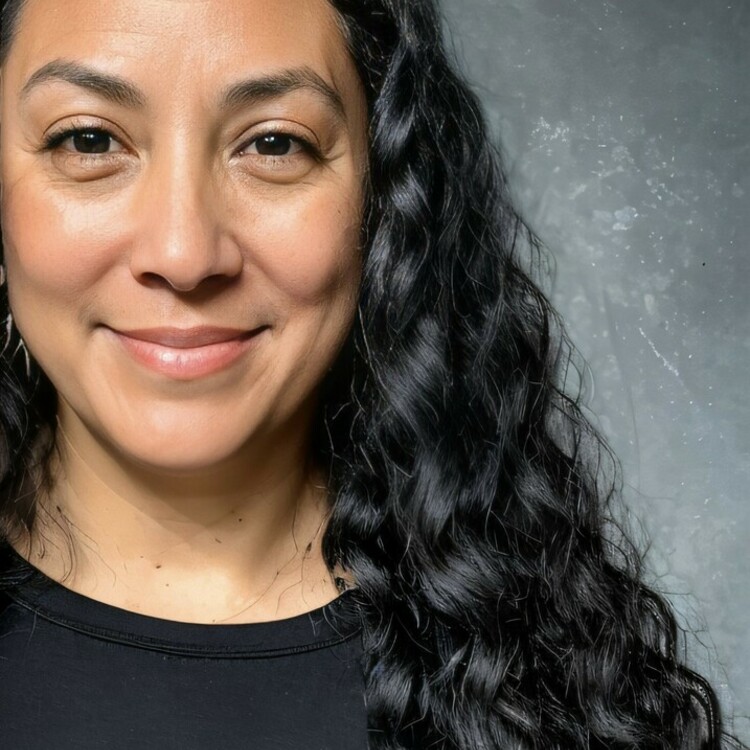
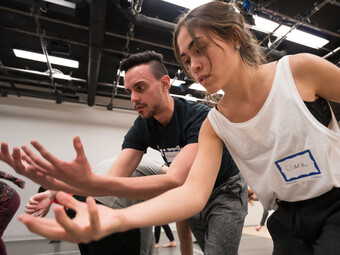

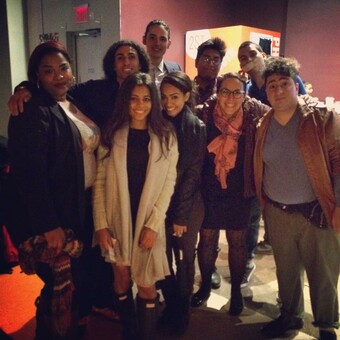

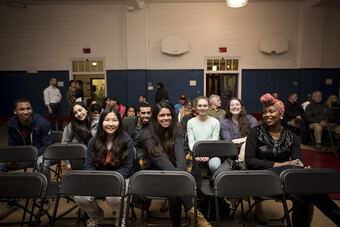

Comments
The article is just the start of the conversation—we want to know what you think about this subject, too! HowlRound is a space for knowledge-sharing, and we welcome spirited, thoughtful, and on-topic dialogue. Find our full comments policy here
Yes, we need more of this. Should be done for Public Housing residents as well. And public servants like police.
HERE also offers free rush tickets to students and teachers - http://here.org/community/a...